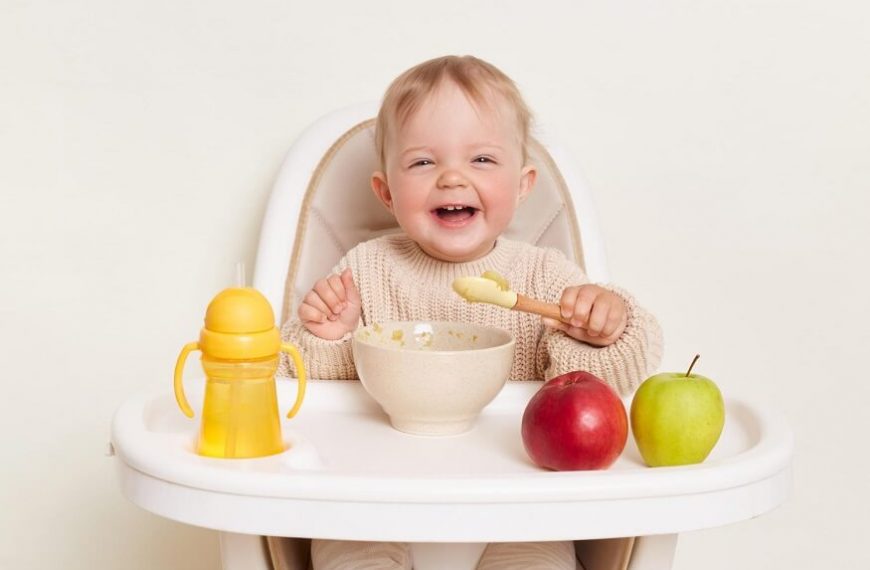Encouraging toddlers to chew their food is an important developmental phase that helps them shift from a soft food diet to a more diversified and healthy one. Chewing food has a multitude of benefits for your toddler’s overall health. Firstly, it aids digestion by breaking down food into smaller particles, allowing for better absorption of nutrients in the stomach and intestines.
Proper chewing also stimulates the production of saliva, which contains enzymes that help initiate the digestion of carbohydrates. Moreover, adequate chewing supports good dental health by reducing the pressure on teeth and promoting saliva flow, which helps protect against tooth decay. By taking the time to chew food thoroughly, you can optimise your toddler’s digestion, nutrient absorption, and overall well-being. In this blog post look over why it is important to chew food and seven easy ways to help your toddler to chew their food.
7 Ways to Encourage Your Toddler to Chew Food
- Provide appropriate textures:
- Be a role model:
- Use a fruit feeder:
- Provide praise and positive reward:
- Encourage self-feeding:
- Be calm and supportive:
- Make use of age-appropriate language:
Include a range of textures in your toddler’s diet, such as crisp fruits and vegetables, soft meats, and chewy grains. The variety will stimulate and engage their chewing muscles. Remember that it takes time for children to learn to eat textures that are accessible to us. At first, try to serve very small portions to minimise mealtime stressful situations.
Eat with your child and demonstrate correct chewing habits. Take your time chewing your food and be enthusiastic about the process. Chew your food slowly and deliberately, making exaggerated chewing motions. By being a positive role model, you can inspire your toddlers to follow your lead and develop healthy chewing habits that will benefit them throughout their lives. Children frequently imitate their parents, so setting a good example of your own might help.
A fruit feeder can be useful for encouraging your child to chew on fruits. These mesh feeders are particularly intended to hold fruits and vegetables. The opening in the mesh bag allows your baby to feel and taste the food while reducing the risk of clogging. It gives children a safe method to experiment with biting and chewing without being afraid. You may introduce a variety of fruits and vegetables to your baby with a fruit feeder, encouraging chewing skills and broadening their desire for food.
When your toddler chews and eats their meal successfully, give them praise and positive reinforcement. Celebrate and encourage their accomplishments. This positive feedback can encourage your child to keep practising and improving his or her chewing skills. You can also make your child sit at the dining table with the rest of the family during meal times. It encourages the child to begin chewing solids by demonstrating how everyone else at the table is chewing their meal.
Allow your youngster to feed themselves using utensils with their own hands. This aids in the development of basic motor skills and promotes independent chewing. Allow your child to explore and experiment with a range of bite-sized foods at their own pace. Try giving them a little authority over their meals by giving them choices. For example, inquire whether they prefer apples, bananas, beans or carrots. This allows children to make decisions and feel more engaged in feeding.
While self-feeding can be messy and time-consuming, it is critical to stay calm and supportive. When your child can feed themselves, avoid taking over and feeding them. Instead, provide moderate instruction and compliment their efforts. Create a comfortable environment without distractions like TV, toys, or electronic devices. Encourage conversation and positive interactions with family members at meals.
Based on the child’s age, keep your directions basic and easy to understand. Use descriptive language to teach them how to chew their food, such as “take smaller bites,” “chew slowly,” or “use your teeth for breaking down the food.” Remember, every child develops at their own pace, so be patient and understanding during this learning process. With the help of these chewing tips, you can teach your toddler how to chew food properly.
Common Side Effects Of Not Chewing Food Properly
- Digestive Issues
- Malnutrition
- Dental Problems
Proper chewing of food is an important aspect of digestion. When your toddler doesn’t chew their meal thoroughly, the stomach and intestines must work harder to break it down. This can result in various digestive issues, such as indigestion, bloating, gas, and stomach discomfort. Inadequate chewing might also prevent nutrients from being absorbed from food.
Proper chewing helps in the initial digestion of food, allowing your body to obtain nutrients more easily. If you don’t chew your food properly, you might not be able to absorb all of its vital nutrients. Even if you eat a balanced diet, this might contribute to malnutrition over time. Inadequate nutrient absorption can lead to insufficient vitamins, minerals, and other essential nutrients for good health.
Chewing food thoroughly breaks it down into tiny bits, reducing the load on your teeth throughout the chewing process. When you don’t chew your food properly, you place extra strain on your teeth, which can lead to dental problems like tooth fractures, tooth sensitivity, and gum disease. Inadequate chewing can also lead to decreased saliva production, necessary for maintaining oral health and preventing tooth decay.
What If My Baby Isn’t Chewing Yet?
Don’t worry if you don’t notice your baby chewing. Some little ones just need more time, especially if they were born early (at 38 weeks or earlier).
Keep a close eye on your baby during mealtimes. Chewing can be subtle. You might miss the small movements inside their mouth, particularly with pureed foods. It’s normal not to see obvious chewing with baby food.
What you should be looking for, even by around 6 months, is frequent chewing on toys and teethers. If that’s not happening yet, don’t stress; you’re in the right place to learn ways to encourage chewing.
When Do Babies Typically Start Chewing?
Babies usually begin chewing on their hands, toys, and teethers between 4 and 6 months. Around this time, they commonly put just about everything in their mouths — toys, hands, and sometimes even things they shouldn’t (like bits of fuzz or dropped food!).
This is how babies explore and learn — through their mouths!
You’ll notice them moving toys from side to side as they play and practise up-and-down jaw movements. This helps them build the skills to chew real foods, usually by 7–8 months.
Still, remember that every baby is different. Some may take a little longer, and it’s normal for chewing skills to develop closer to 9 or 10 months. However, by around 11 months, we typically expect babies to start handling small pieces of table food.
The good news?
If a baby has had plenty of practice chewing on toys and teethers, it often naturally picks up the skill between 8 and 11 months. Even if chewing hasn’t started by 12 months or later, it’s definitely still possible—it might just take a bit more hands-on support using the tips I’ll share.
Chewing Challenges in Toddlers
Sometimes, toddlers miss the early window for developing chewing skills and still struggle at one or even two years old. If this sounds like your child, remember: it’s never too late to help them learn.
It’s a good idea to seek additional help for toddlers over 12 months who mainly drink milk or eat purees. Meanwhile, if your kid is grappling with indigestion due to not chewing the food adequately, check out our blog, Natural Home Remedies For Child Indigestion, for home remedies. You can also visit EuroKids Blogs for more information on your little one’s health, development, and nutrition. Don’t forget to check out EuroKids Preschools for the first step in your child’s learning journey.
















